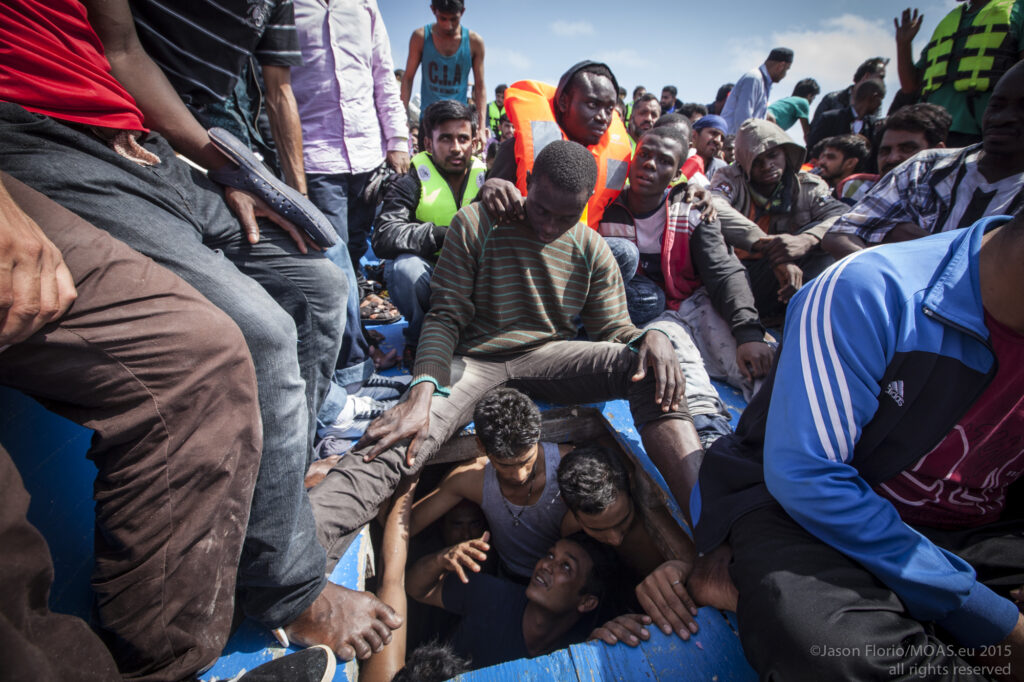Up to 200 people died on Thursday when a boat bound for Italy sank off the Libyan coast. On the same day, more than 70 bodies were discovered by Austrian authorities in an abandoned lorry on a motorway at the border with Hungary.
These are just the latest awful figures of the unending refugee crises at Europe’s borders.

Last Wednesday, MOAS was involved in multiple rescue operations during which 1,000 people were saved. MOAS also supported the Swedish Rescue Ship Poseidon during the latest tragic incident when 52 died, the majority asphyxiated.
More than 10,000 men, women and children in distress have been rescued at sea by Migrant Offshore Aid Station (MOAS), as Europe’s first privately funded search and rescue marks one year from its first rescue on August 30th.
The rescues have taken place amid the worst maritime refugee crisis the world has ever seen – and there appears to be no end in sight to the drama at sea.
The reality is stark. More than 2,500 alone died at sea this year, an all-time record. As many as 20,000 people may have lost their lives in the at sea trying to reach Europe’ shores on unsafe boats.
MOAS continues operating on the frontline in the Mediterranean, the world’s deadliest border, and it hopes to inspire others to do their bit to save lives at sea.
As thousands more continue to pile into rickety, overcrowded boats, MOAS’s presence at sea becomes more important. We need to conduct search and rescue and prevent vulnerable people from dying trying to reach safety in Europe.

Following the shipwreck of April 2015, when about 800 people lost their life, MOAS has welcomed the decision by the EU to strengthen the search and rescue efforts by tripling the fund for Frontex and expanding its mandate.
MOAS is also pleased to have paved the way to an increase in the involvement of other independent entities as well as EU member states in mitigating further loss of life at sea. As a result of this collaboration between state-run and private search and rescue efforts, the number of people dying dropped significantly during the months of May and June.
However, the latest tragedies clearly show that the assets at sea and the efforts to save people are not enough and the maritime humanitarian crisis is far from being over.
“We are experiencing mass migratory movements as a direct result of conflict in various parts of the world. Europe should take the lead because this is happening in its backyard but others should also show their support”, said director of MOAS, Martin Xuereb.
“As long as thousands of human beings feel they have no other option other than embarking on a life-threatening crossing, MOAS urges decision makers to put SAR at the top of their agendas. A collective humanitarian action at sea – by governments, NGOs, private initiatives – continues to be vital”, he added.
An international NGO with operational base in Malta, MOAS is equipped with the a 40-metre vessel – M.Y. Phoenix –, two Schiebel Campcopter S-100 systems, two rescue RHIBs, and a 20-strong professional crew of seafarers, rescuers, doctors and paramedics. MOAS set sail on May 2nd 2015, after saving some 3,000 lives in 60 days last year. This year MOAS has partnered with Medecins Sans Frontieres which take care is responsible for the post-rescue care on board.
MOAS will be operating in the Mediterranean at least till the end of October. Its presence at sea beyond that will depend also on the donations that the Foundation will receive in the coming months.
Download photos here: https://www.moas.eu/press-images/
For more information please contact:
Christian Peregin: [email protected] or +356 79 24 11 87
Maria Teresa Sette: [email protected] +356 79849591

